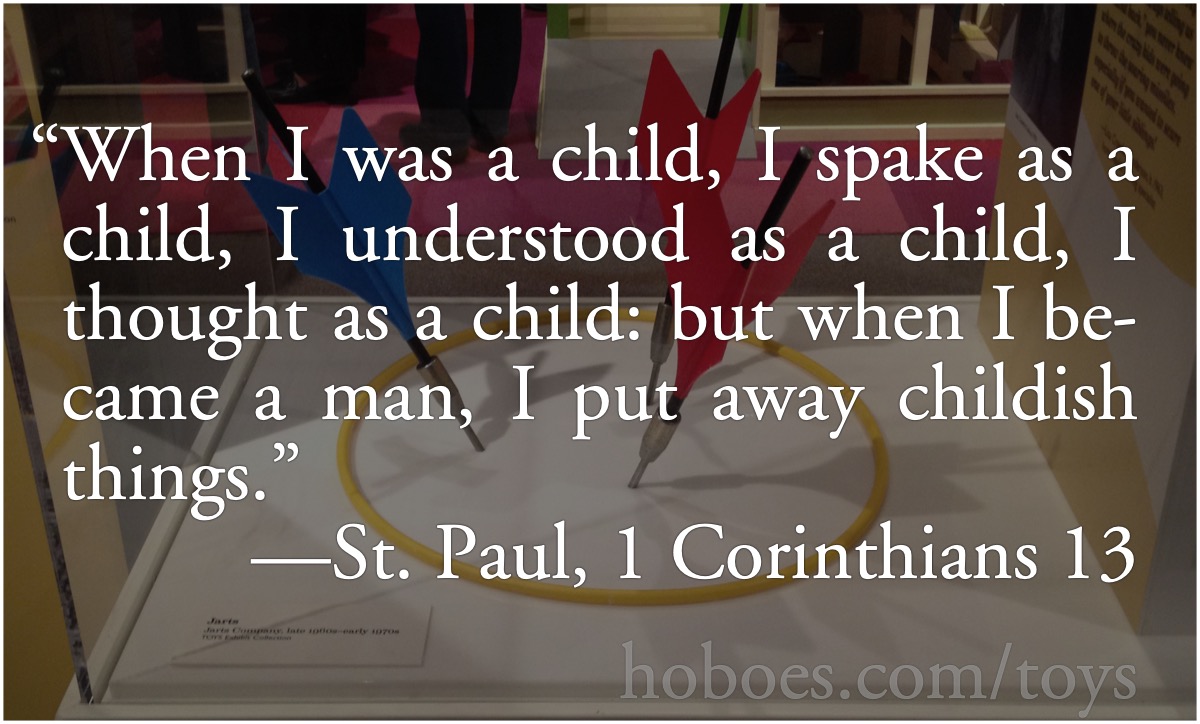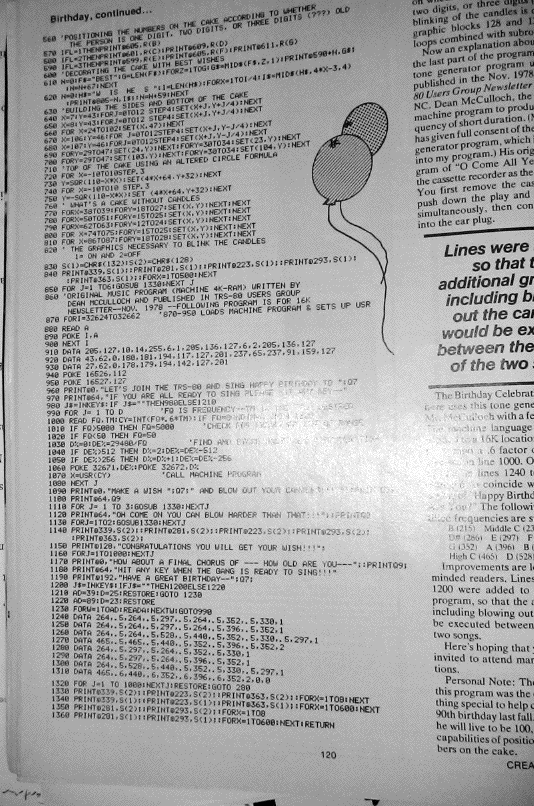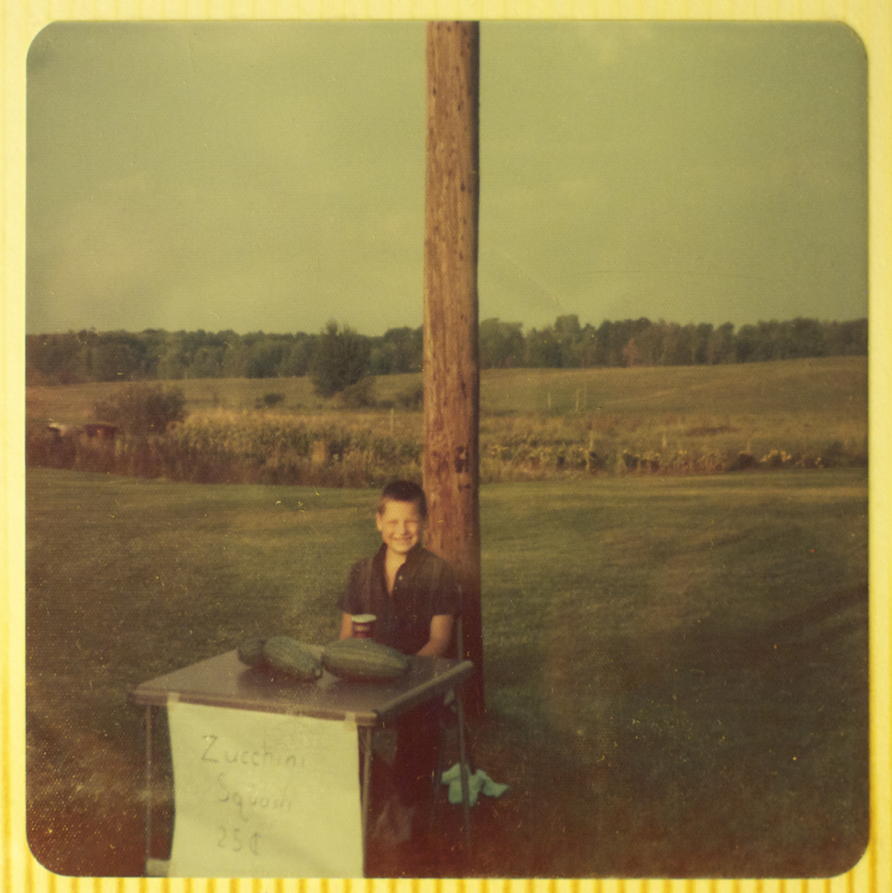Negative Space: free-time play
- The basement was my university
- Free play is how children become scientists. It inspires creativity, which can be both dangerous and rewarding, often at the same time.
- Childish things: the decline of toys and the fall of man
-
 The old admonishment to put away childish things misses, in a very important sense, a critical point: we can never put away childish things. The way we interact with toys as children is how we interact with life as adults. If your toys have not taught you to sift evidence, weigh risks, and make decisions, the world becomes a very frightening place.
The old admonishment to put away childish things misses, in a very important sense, a critical point: we can never put away childish things. The way we interact with toys as children is how we interact with life as adults. If your toys have not taught you to sift evidence, weigh risks, and make decisions, the world becomes a very frightening place.
- Learning to program without BASIC
-
 If BASIC is dead, how can our children—or anyone else—learn to program? Today people interested in programming have far more options available to get started hacking their computers.
If BASIC is dead, how can our children—or anyone else—learn to program? Today people interested in programming have far more options available to get started hacking their computers.
- Lost children
- “No one was able to reach us all day.”
- What children don’t do, adults don’t know
-
 What children learn, the adult they become understands better.
What children learn, the adult they become understands better.
- Young chemists under the law
- When chemistry sets are outlawed, only outlaws will know chemistry.
More Information
- All gaming is Pastiche
-
“It’s a shame that we use so many extant terms from places like creative writing and theatrical improvisation in order to describe the act of table-top role-playing games. We do have our own jargon, but most of it is fun, whimsical, and more than somewhat esoteric. Or, to my chagrin, it’s borrowed from the video game industry—which wouldn’t exist in its current form without D&D in the first place… What we do at the gaming table is neither fish nor fowl.”
- The Most Precious Resource is Agency
-
“Readers (and often biographers) tend to fixate around the celebrity itself, when people became famous or fortunate. But the early lives, long before success, contain something revealing. Before you grasp, you have to reach. How did they learn to reach?”
- in praise of lawn darts
-
“the basis for a civilization of free people resides in the skills that children learn from the benign neglect of unsupervised play in an un-nerfed world”
- Child Neglect and the “Free Range Kid” (PDF)
-
“Even one generation ago, the norms were different for determining the age at which a child no longer needed a babysitter. The expected minimum age for babysitters has gone up as well, although in the few states that have legislated specific ages, the thresholds vary widely. In Illinois, it is illegal to leave a child under 14 unsupervised for an ‘unreasonable period of time’; in Maryland, in contrast, a 13-year- old is considered old enough not only to care for himself, but to babysit infants. The days when 11- and 12-year-old neighborhood kids were considered competent babysitters appear to be long gone.” (David Pimentel)
 The old admonishment to put away childish things misses, in a very important sense, a critical point: we can never put away childish things. The way we interact with toys as children is how we interact with life as adults. If your toys have not taught you to sift evidence, weigh risks, and make decisions, the world becomes a very frightening place.
The old admonishment to put away childish things misses, in a very important sense, a critical point: we can never put away childish things. The way we interact with toys as children is how we interact with life as adults. If your toys have not taught you to sift evidence, weigh risks, and make decisions, the world becomes a very frightening place. If BASIC is dead, how can our children—or anyone else—learn to program? Today people interested in programming have far more options available to get started hacking their computers.
If BASIC is dead, how can our children—or anyone else—learn to program? Today people interested in programming have far more options available to get started hacking their computers. What children learn, the adult they become understands better.
What children learn, the adult they become understands better.